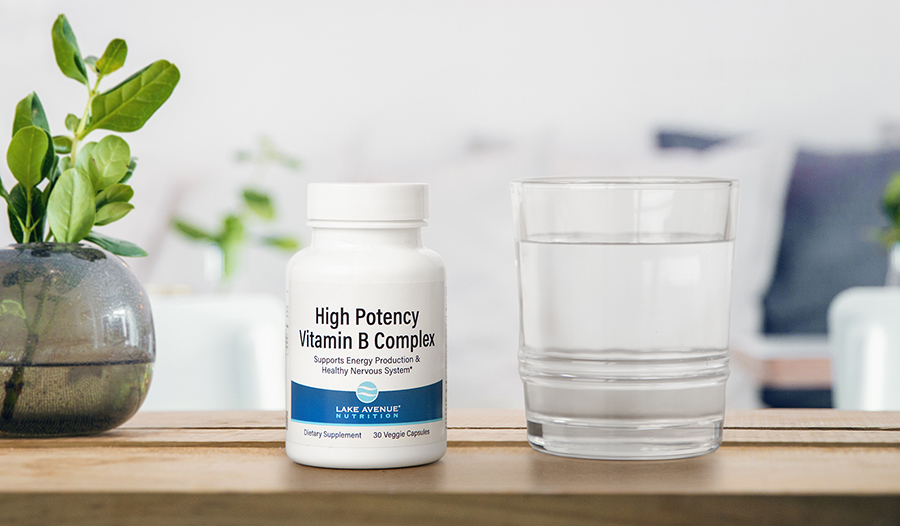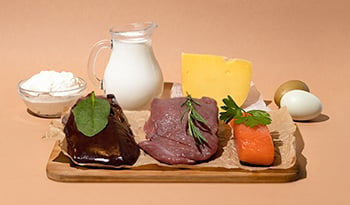The Benefits of a Vitamin B Complex Supplement
DISCLAIMER:This blog does not intend to provide diagnosis...
- In this article:
- The B Vitamins
- Vitamin B1 (Thiamine)
- Vitamin B2 (Riboflavin)
- Vitamin B3 (Niacin)
- Vitamin B5 (Pantothenic Acid)
- Vitamin B6 (Pyridoxine)
- Vitamin B7 (Biotin)
- Vitamin B9 (Folate)
- Vitamin B12 (Cobalamin)
- Takeaway

Your body needs B vitamins for a variety of daily cellular chemical reactions that occur in your body. Preventing any deficiency in these vitamins is key since B vitamins help your body do many cellular functions and are important for optimal health. This article will review the benefits of B vitamins and whether you should supplement with a multivitamin Vitamin B complex.
The B Vitamins
The two main groups of vitamins are fat-soluble and water-soluble vitamins. Fat-soluble vitamins are easily stored in the body, normally fat (hence the name). On the other hand, water-soluble vitamins dissolve in water upon entering the body, meaning we cannot store them as they are filtered by the kidneys and then excreted in the urine. The water-soluble B vitamins that are beneficial in a diet include:
- Vitamin B1 (Thiamine)
- Vitamin B2 (Riboflavin)
- Vitamin B3 (Niacin)
- Vitamin B5 (Pantothenic acid)
- Vitamin B6 (Pyridoxine)
- Vitamin B7 (Biotin)
- Vitamin B9 (Folate)
- Vitamin B12 (Cobalamin)
Several manufacturers make multivitamins composed of only water-soluble vitamins, often termed Vitamin B Complex, and contain all eight water-soluble B vitamins. Sometimes they also contain Vitamin C, another water-soluble vitamin. According to the U.S. Food and Drug Administration, FDA, multivitamins may be labeled as "high-potency" if they contain 100% or more of the recommended daily intake for the respective vitamin. "High-potency” may be used to describe vitamins or minerals in a product that contains other nutrients as well.
Vitamin B1 (Thiamine)
Vitamin B1 otherwise known as Thiamine helps turn the food that you eat into energy. This vitamin is important for growth and development and many cellular functions. Most adults need between 1.1 to 1.2 mg per day of thiamine. This vitamin is found in whole grains and fortified bread, cereals, pasta, and rice. It can also be found in meats, fish, legumes seeds, and nuts.
Most people have plenty of thiamine in their diet since many foods are fortified with this vitamin. But if you do suffer from chronic conditions that affect your gastrointestinal and your endocrine system or take diuretics drugs for high blood pressure, you may be at a greater risk of having thiamine deficiency. You need to be severely deficient in thiamine for your body to exhibit symptoms of vitamin deficiency. These are serious symptoms and can include muscle weakness, poor reflexes, and a condition known as beriberi. This condition affects your cardiovascular symptoms and was seen in the past when grains were not fortified with B vitamins.
Another reason why people may be deficient in thiamine may be due to excess alcohol consumption because thiamine is required by the body to metabolize alcohol, leading to a deficiency if one is consuming excess amounts. The Centers for Disease Control and Prevention recommend 1 drink or less in a day for women and 2 drinks or less in a day for men.
Vitamin B2 (Riboflavin)
Riboflavin is another important vitamin that helps turn food into the energy you need and also for the function of your cells. Most adults need between 1.1 to 1.3 mg per day of riboflavin. Riboflavin is found in foods like eggs, meats, milk, green vegetables, fortified cereals, bread, and grain products. Your skin will be the first impacted organ system if you're not taking in enough riboflavin. Riboflavin deficiency may show up as sores in the corners of your mouth swollen or even cracked lips and hair loss. If a person has long-term riboflavin deficiency, they may have lower amounts of red blood cells, which may lead to feelings of weakness and fatigue or conditions otherwise known as anemia.
Riboflavin has been found to have great benefits for chronic conditions like headaches. In a 1998 clinical trial published in neurology, two control trials with high dose riboflavin dosages of 400 mg per day show that when compared with placebo riboflavin reduced the frequency of migraine headaches and the number of days with headaches. Note that, if you do suffer from chronic conditions like headaches or migraines, consult with your health care provider to see if supplementing with riboflavin is recommended for you as a prophylactic to headaches.
Vitamin B3 (Niacin)
Niacin is another B vitamin that is essential for many of the cellular pathways involved in turning your food into energy. Your body can make niacin from the amino acid tryptophan. The recommended daily intake of niacin for adults is between 14 to 16 mg. Other foods that will be rich in niacin include lean meats, nuts, legumes, grains, and other enriched or fortified foods.
High doses of niacin have been studied by scientists and have been found to elevate good cholesterol and lower bad cholesterol. This was further studied in two large studies, the AIM-HIGH and HPS2 THRIVE studies, but they had mixed results. Thus, many health care providers will not initially prescribe niacin for conditions like hyperlipidemia, but it may be beneficial in helping to raise your good cholesterol before developing any other cardiovascular condition.
Vitamin B5 (Pantothenic Acid)
Like other B vitamins, pantothenic acid is important in turning food into fuel for the body, but it is also important for making the hormones your body needs. Adults need 5 mg per day of pantothenic acid. In addition to being found in meats, eggs, milk, fortified cereals, and vegetables, this vitamin is found in mushrooms, avocados, peanuts, and chickpeas. Deficiency in this vitamin is rare since it is found in many foods.
Vitamin B6 (Pyridoxine)
More than 100 reactions in the body require pyridoxine, thus making it an especially critical vitamin to humans. You need 1.2 to 1.7 mg per day of Vitamin B6, and it can be found in animal meals, potatoes, other starchy vegetables, and a variety of non-citrus fruits. There is important work being done to see if having higher levels of Vitamin B6 helps with memory. Additionally, the American Congress of Obstetricians and Gynecologists recommends supplementing with Vitamin B6 in women who experience severe bouts of morning sickness when pregnant.
Vitamin B7 (Biotin)
Biotin is a B vitamin that is also found in many foods and helps turn the food you eat into fuel. Adults need about 30 micrograms (mcg) per day, and it can be found in animal meats, seeds, nuts, and vegetables like sweet potatoes, spinach, and broccoli. Biotin is a contributor to making the protein keratin, which is the type of protein that makes up your hair, skin, and nails. Supplementing with 35–70 mcg per day is believed to provide some benefit in individuals with thinning hair or nails, but more additional studies are needed since the evidence is mixed.
Vitamin B9 (Folate)
Folate or folic acid is incredibly important for the synthesis of your genetic material both DNA and RNA. You need about 400 mcg of folate per day, but most importantly women who are trying to conceive or who are already pregnant are recommended to supplement with at least 600 mcg of folate. Folate is abundant in many vegetables, fruits, nuts, beans, enriched bread, fortified cereals, and cornflour. Without enough folate, you can develop conditions that affect your blood like anemia. If pregnant, it is important to supplement with a high dose of folate for a healthy baby. That means you will need higher levels than those recommended for men or nonpregnant women, up to 4 mg if advised by your obstetrician. Finally supplementing with folate up to 1 mg may help with regulating your mood since several studies since the 1960s have found varying data showing the benefits of supplementing with folate and improvement of mood.
Vitamin B12 (Cobalamin)
Vitamin B12 is important for the function of your nervous system, and it also helps with the synthesis of your genetic material like DNA. You need about 2.4 mcg per day of Vitamin B12, and this can be found mainly in animal products and sometimes in fortified foods like breakfast cereals. Since B12 is mainly found in animal products, it is important for people who adhere to a vegan or vegetarian diet to supplement with a high dose of vitamin B12 since low levels can lead to problems such as lack of red blood cells (anemia) or problems with their nerves that can lead to numbness or balance problems.
Takeaway
Daily supplementation with B vitamins may help you maximize how your body turns the food you eat into fuel. It may also benefit your mood, heart, and skin, and help your cells continue to divide as you grow. Another reason why it's a good idea to supplement with a Vitamin B complex is our inability to store B vitamins in our body. So consider taking a multivitamin with a High-Potency Vitamin B complex if you want to optimize your body's potential when converting the food you eat into the fuel you need.
References:
- B vitamins. MedlinePlus. https://medlineplus.gov/bvitamins.html. Published March 28, 2022. Accessed April 3, 2022.
- Center for Food Safety and Applied Nutrition. SECG on nutrient content claim definitions. U.S. Food and Drug Administration. https://www.fda.gov/regulatory-information/search-fda-guidance-documents/small-entity-compliance-guide-nutrient-content-claims-definition-high-potency-and-definition#:~:text=High%20Potency%20Claims&text=This%20means%20a%20supplement%20may,of%20the%20high%20potency%20claim%3F. Accessed April 5, 2022.
- Facts about moderate drinking. Centers for Disease Control and Prevention. https://www.cdc.gov/alcohol/fact-sheets/moderate-drinking.htm. Published March 29, 2022. Accessed April 3, 2022.
- Lykstad J, Sharma S. Biochemistry, Water Soluble Vitamins. [Updated 2021 Mar 7]. In: StatPearls [Internet]. Treasure Island (FL): StatPearls Publishing; 2022 Jan-. Available from: https://www.ncbi.nlm.nih.gov/books/NBK538510/
- Morning sickness: Nausea and vomiting of pregnancy. ACOG. https://www.acog.org/womens-health/faqs/morning-sickness-nausea-and-vomiting-of-pregnancy. Accessed April 3, 2022.
- Patel DP, Swink SM, Castelo-Soccio L. A Review of the Use of Biotin for Hair Loss. Skin Appendage Disord. 2017;3(3):166-169. doi:10.1159/000462981
- Office of dietary supplements - biotin. NIH Office of Dietary Supplements. https://ods.od.nih.gov/factsheets/Biotin-Consumer/. Accessed April 3, 2022.
- Office of dietary supplements - folate. NIH Office of Dietary Supplements. https://ods.od.nih.gov/factsheets/Folate-Consumer/. Accessed April 3, 2022.
- Office of dietary supplements - niacin. NIH Office of Dietary Supplements. https://ods.od.nih.gov/factsheets/Niacin-Consumer/. Accessed April 3, 2022.
- Office of dietary supplements - riboflavin. NIH Office of Dietary Supplements. https://ods.od.nih.gov/factsheets/Riboflavin-Consumer/. Accessed April 3, 2022.
- Office of dietary supplements - pantothenic acid. NIH Office of Dietary Supplements. https://ods.od.nih.gov/factsheets/PantothenicAcid-Consumer/. Accessed April 3, 2022.
- Office of dietary supplements - thiamin. NIH Office of Dietary Supplements. https://ods.od.nih.gov/factsheets/Thiamin-Consumer/. Accessed April 3, 2022.
- Office of dietary supplements - vitamin B6. NIH Office of Dietary Supplements. https://ods.od.nih.gov/factsheets/VitaminB6-Consumer/. Accessed April 3, 2022.
- Office of dietary supplements - vitamin B12. NIH Office of Dietary Supplements. https://ods.od.nih.gov/factsheets/VitaminB12-Consumer/. Accessed April 3, 2022.
- Recommendations: Women & folic acid. Centers for Disease Control and Prevention. https://www.cdc.gov/ncbddd/folicacid/recommendations.html. Published November 15, 2021. Accessed April 3, 2022.
- Schoenen J, Jacquy J, Lenaerts M. Effectiveness of high-dose riboflavin in migraine prophylaxis. A randomized controlled trial. Neurology. 1998;50(2):466-470. doi: 10.1212/wnl.50.2.466
- Young SN. Folate and depression—a neglected problem. J Psychiatry Neurosci. 2007;32(2):80-82.
- Zeman M, Vecka M, Perlík F, et al. Niacin in the Treatment of Hyperlipidemias in Light of New Clinical Trials: Has Niacin Lost its Place? Med Sci Monit. 2015;21:2156-2162. Published 2015 Jul 25. doi:10.12659/MSM.893619

 By Dr. Gabriel Espinoza, M.D.
By Dr. Gabriel Espinoza, M.D.


